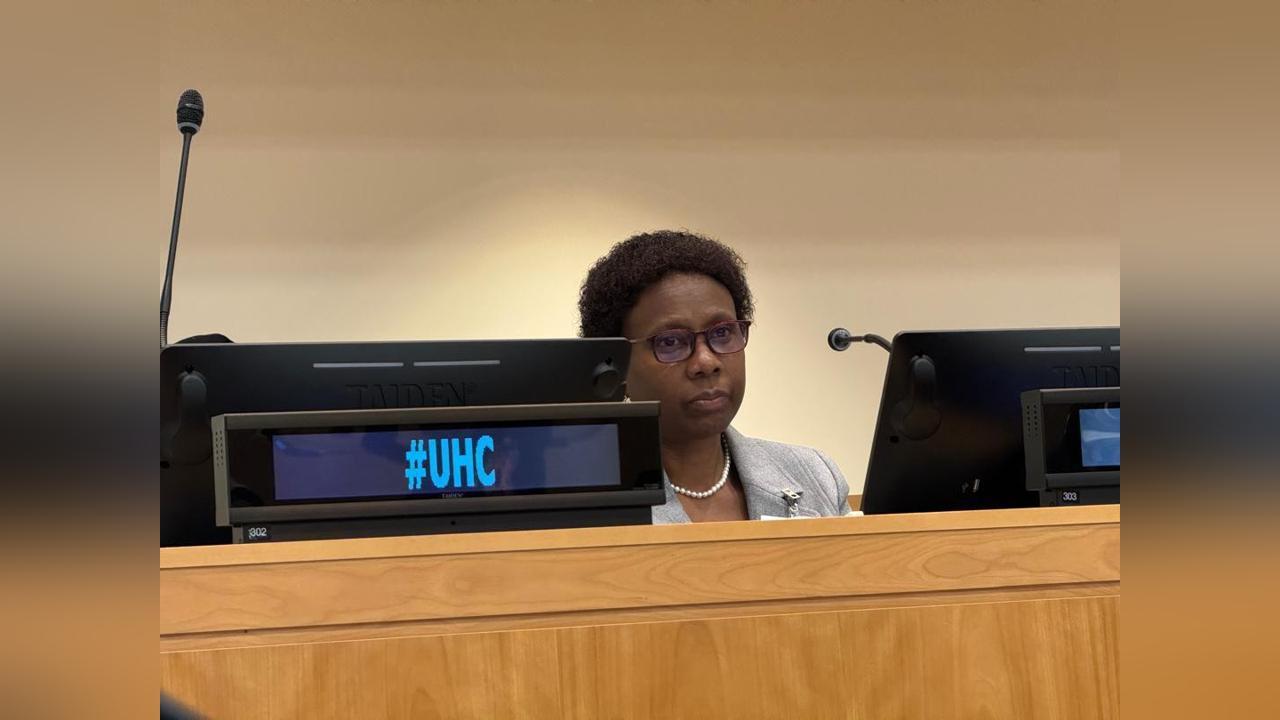Africa-Press – Uganda. Uganda has made notable strides toward UHC over the past two decades, with the service coverage index doubling from 22% to 50% between 2000 and 2020.
Health minister oJane Ruth Aceng has reaffirmed the country’s commitment to achieving universal health coverage (UHC) by 2030, emphasizing the importance of financial protection as a key pillar of this mission.
Speaking at the 5th Annual Ministerial Meeting of the Group of Friends of Universal Health Coverage and Global Health, held on the sidelines of the UN General Assembly in New York, D. Aceng outlined Uganda’s progress and challenges in securing equitable healthcare for all.
“Financial protection is a fundamental means to ensure that every individual can access the care they need without the fear of financial hardship,” Dr Aceng said.
Her address focused on Uganda’s ongoing reforms aimed at reducing catastrophic health expenditures and improving access to healthcare services.
Uganda has made notable strides toward UHC over the past two decades, with the service coverage index doubling from 22% to 50% between 2000 and 2020.
However, Dr Aceng highlighted the challenges the country still faces in the realm of financial protection, pointing out that 13.6% of Ugandans faced catastrophic health expenditures in 2020.
This, she noted, underscored the need for more comprehensive strategies to ensure universal access to healthcare without the risk of financial ruin.
“Achieving true UHC requires much more than improving access to services,” she said.
A Ministry of Health assessment, in collaboration with the World Health Organization, revealed that underfunding, stock-outs in public health facilities, reliance on private healthcare, and inequitable access are some of the major factors contributing to high out-of-pocket healthcare costs for Ugandans.
To address these challenges, Uganda has undertaken several key reforms. Over the past three years, the domestic health budget has more than doubled, accompanied by efficiency measures that ensure better resource allocation.
The integration of health programs and improved tracking of spending has also freed up resources for reinvestment in priority areas.
One of the central reforms has been improving access to essential medicines. Through the National Medical Stores, Uganda is now ensuring last-mile delivery of medicines to health facilities across the country.
Dr Aceng also highlighted the implementation of a digitized logistics system that tracks medical supplies and enhances accountability.
Equity and quality in healthcare have been boosted through the institutionalization of results-based financing in primary healthcare.
Uganda has also revised its resource allocation formula, prioritizing underserved communities, which ensures a more equitable distribution of health resources.
These reforms are already yielding significant results. The latest National Health Accounts report shows that out-of-pocket health spending has dropped from 44% of total health expenditure in 2017/18 to 28% in 2020/21, a major step toward relieving financial pressures on Ugandan households.
Dr. Aceng stressed the importance of continued government investment in healthcare, aligning Uganda’s health budget goals with the Abuja Declaration target of 15% of government expenditure and 4% of GDP.
To further bolster financial protection, Uganda is exploring innovative financing mechanisms. Dr. Aceng noted that the Ministry of Health is advocating for sin taxes and debt-to-health swaps, as well as working to establish a national health insurance scheme.
Additionally, Dr. Aceng underscored the link between financial protection and the fight against antimicrobial resistance (AMR).
Ensuring equitable access to affordable medicines and reducing out-of-pocket healthcare spending, she explained, plays a critical role in mitigating the overuse of antibiotics, a major contributor to AMR.
Dr Aceng reaffirmed Uganda’s unwavering commitment to achieving UHC by 2030 through sustainable and equitable healthcare financing.
“Financial protection is at the heart of this mission, and we remain steadfast in our efforts to ensure that health systems work for all, especially the most vulnerable,” she said.
For More News And Analysis About Uganda Follow Africa-Press






